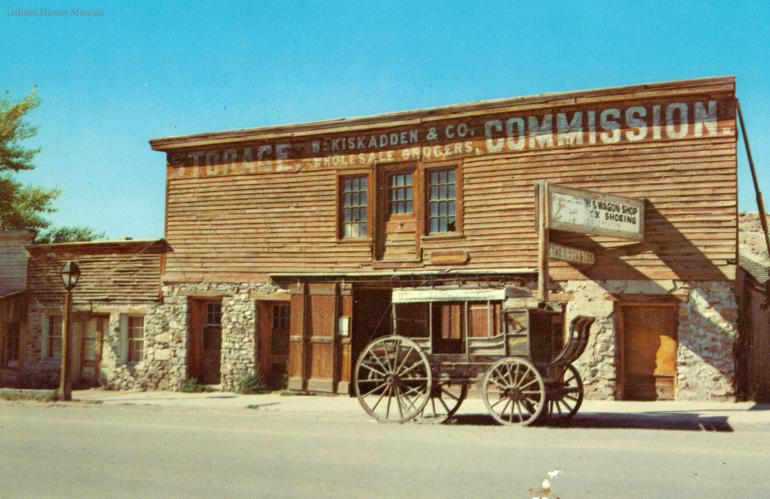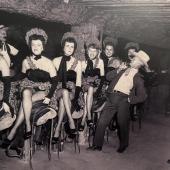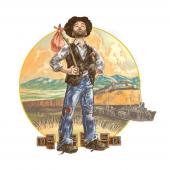WILD WEST WORDS: Banjo, Eskimo/Husky, and Vigilante
Banjo

There has been speculation surrounding the origin of the term banjo. The Oxford Dictionary of English Etymology asserts banjo is an alteration of the Spanish term bandore, a 16th century lute-like instrument.
But in her 1994 book That Half-Barbaric Twang, the Banjo in American Popular Culture, ethnomusicologist Karen Linn contends that the word and the instrument are of African origin. She writes, “The North American banjo developed from an African prototype. [It] was made from a gourd with a slice taken out of it, covered with a skin head, fitted with a neck and strung with several strings.”
African slaves in both the West Indies and North America called this instrument variously banjul, banza, banjer and banhshaw. Thomas Jefferson wrote, “The instrument proper to [the slaves] is the Banjar, which they brought thither from Africa.” Sources citing an African origin of banjo assert it is a form of mbanza, the name of a stringed instrument in the Kimbundu language of northern Angola.
The simple skin-covered gourd with neck and strings is a great gift from the African continent to the musical world. As the instrument evolved in North America, the sound of the banjo played a significant role in the development of the American songbook.
One more etymological note: if the African origin story of banjo is accurate, the word then falls into kinship with other words on loan from the languages of that continent. Boogie-woogie, chigger, goober, jazz, jukebox, tote, voodoo, yam and zombie trace their origins to the various tongues of Africa.
Eskimo/Husky
The term Eskimo appeared in print for the first time in the English document A Discourse Concerning Western Planting in the Year 1584. Its author, Englishman Richard Hakluyt, a promoter of New World colonization, wrote the document in part to convince English merchants to invest in American enterprises.
Hakluyt made reference in his discourse to the indigenous people of the American northeast, naming them “Esquimawes,” a term probably taken from the Algonquin languages. It’s been variously translated as “eaters of raw meat,” “snowshoe-maker,” and “people who speak a different language.”

Over the centuries, the word, cobbled together in such variants as Eskemoe, Esquimaux, Esquimo and Ehuskemay spread to the west and the north with European incursion. It eventually stabilized as Eskimo, a term referring generically to all indigenous circumpolar people in Canada, Alaska, Greenland and eastern Siberia.
Ehuskemay, a variant of the word used in Canada, was by the 1830s abbreviated to Hoskey and Huskey. An article in an 1830 edition of the Northern Quebec and Labrador Journal and Courier mentions a river basin “full of Hoskies.” The Pall Mall Gazette of April, 1889 observes, “The Indians were terribly afraid of the [natives] who…are called Huskeys.”
As many 19th century European sources noted, the “Huskeys” relied on sled dogs for hauling goods and game. Associated with the Arctic people who raised them, the dogs acquired the name Husky in the mid 1800s, and carry it to this day. The original Siberian Husky, a breed thousands of years old, was developed by the Chukchi, a people native to the Chukchi Peninsula on the far eastern coast of Siberia, mere miles from Alaska.
Vigilante
Groups of private citizens who organized to punish robbers, murderers, horse and cattle thieves in pre-territorial and territorial Montana operated under the code of Vigilance Committees. In 1864, the Vigilance Committee of Alder Gulch, soon called simply “the vigilantes,” had imposed the “hempen solution” on 21 local men accused of robbery.
The next year, the Alder Gulch vigilantes posted a public notice in Virginia City announcing their intention to “inflict summary punishment upon any and all malefactors in any case where the civil authorities are unable to enforce the proper penalty of the law.” Readers of that notice inclined toward “malefaction” might well have remembered the lynchings dealt the year before by this watchful gang.

Vigilantism, whether practiced in the western American frontier or at other points of the globe, takes its name from the Latin verb vigilare, “to keep awake.” Vigilantes are etymologically obliged to “stay awake and alert” to the deeds of malefactors and scoundrels. Vigilante is related to vigor, surveillance and vigil, a time to “keep watch.”
One of the earliest citations of the word vigilante occurs in American journalist Albert Dean Richardson’s 1865 travel memoir Beyond the Mississippi, From the Great River to the Great Ocean, Life and Adventures on the Prairies, Mountains and Pacific Coast. Dean writes, “The power [in Montana] is vested in the ‘Vigilantes’, a secret tribunal of citizens, organized before civil laws were framed.”












Leave a Comment Here